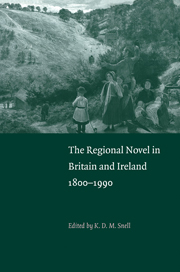Book contents
- Frontmatter
- Contents
- Preface and acknowledgements
- 1 The regional novel: themes for interdisciplinary research
- 2 Regionalism and nationalism: Maria Edgeworth, Walter Scott and the definition of Britishness
- 3 The deep romance of Manchester: Gaskell's ‘Mary Barton’
- 4 Geographies of Hardy's Wessex
- 5 Gender and Cornwall: Charles Kingsley to Daphne du Maurier
- 6 James Joyce and mythic realism
- 7 Cookson, Chaplin and Common: three northern writers in 1951
- 8 Emyr Humphreys: regional novelist?
- 9 Scotland and the regional novel
- 10 Mapping the modern city: Alan Sillitoe's Nottingham novels
- Index
2 - Regionalism and nationalism: Maria Edgeworth, Walter Scott and the definition of Britishness
Published online by Cambridge University Press: 18 December 2009
- Frontmatter
- Contents
- Preface and acknowledgements
- 1 The regional novel: themes for interdisciplinary research
- 2 Regionalism and nationalism: Maria Edgeworth, Walter Scott and the definition of Britishness
- 3 The deep romance of Manchester: Gaskell's ‘Mary Barton’
- 4 Geographies of Hardy's Wessex
- 5 Gender and Cornwall: Charles Kingsley to Daphne du Maurier
- 6 James Joyce and mythic realism
- 7 Cookson, Chaplin and Common: three northern writers in 1951
- 8 Emyr Humphreys: regional novelist?
- 9 Scotland and the regional novel
- 10 Mapping the modern city: Alan Sillitoe's Nottingham novels
- Index
Summary
The origins of the regional novel have conventionally been traced back to Maria Edgeworth and Walter Scott. Yet Edgeworth's Ireland and Scott's Scotland are hardly regions comparable to Hardy's Wessex, Blackmore's Exmoor, or Arnold Bennett's potteries, for as well as being emotional or literary units, they are nations. I want to suggest, however, that the fact that the form of what we know as the regional novel was developed by writers exploring national rather than purely local or provincial cultures has important implications for the political status of the genre, and for the construction of literary histories of Ireland and Scotland.
Edgeworth and Scott responded in rather different ways to the peculiar histories of their respective countries, but many attempts have been made to develop broad generalisations about the two writers and the circumstances in which their regional works were produced. This approach has the sanction of almost two centuries of criticism, and the parallel was originally drawn by Scott himself. In a well-known passage in the General Preface to the 1829 edition of Waverley he explained that one of the reasons for writing the novel was that he ‘felt that something might be attempted for [his] own country, of the same kind with that which Miss Edgeworth so fortunately achieved for Ireland’. He therefore sought to produce ‘something which might introduce her natives to those of the sister kingdom, in a more favourable light than they have been placed hitherto, and tend to procure sympathy for their virtues and indulgence for their foibles’.
- Type
- Chapter
- Information
- The Regional Novel in Britain and Ireland1800–1990, pp. 54 - 77Publisher: Cambridge University PressPrint publication year: 1998
- 5
- Cited by



